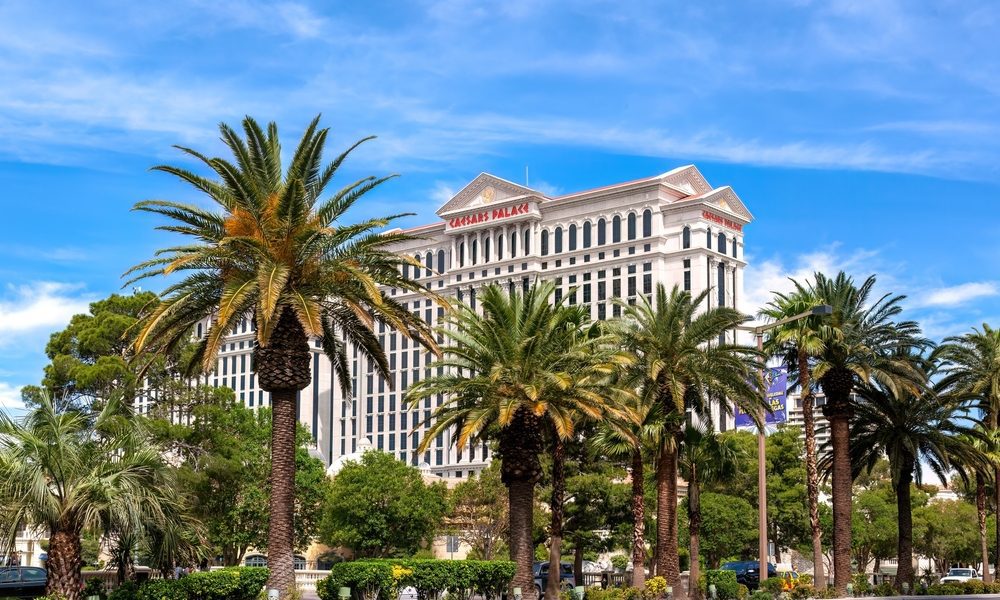Caesars Entertainment executives said the operator saw the impact of the slowdown in Las Vegas tourism in its second quarter results, but they expect a pickup by the end of the year and into 2026.
During an earnings call Tuesday, Anthony Carano, Caesars president and chief operating officer, said the company’s Las Vegas segment posted a 3.7% decline in revenue and an 8% decline in adjusted earnings. He called that “solid results in the face of softer demand in our hospitality vertical but we remain encouraged by forward group (bookings) in Q4 and the first half of 2026.”
That contrasted with regional revenues up 3.6%, with the opening of two new properties and same-store gaming revenue growth, Carano said.
Las Vegas had same-store adjusted EBITDAR of $469 million with 97% occupancy versus 99% a year ago, and rates that were flat, Carano said. Gaming faced a difficult comparison to last year, which drove lower year-over-year table games volume and hold.
Group room night mix during the quarter was 15% and is on track to deliver record adjusted earnings in 2025 due to their strong fourth quarter booking pace, Carano said.
Caesars touted the performance of its digital segment delivering $343 million in net revenues, up 24% versus the prior year and that they set an all-time adjusted earnings record of $80 million, doubling a year ago. Over the last 12 months, Caesars Digital has produced about $200 million in adjusted earnings.
Second quarter digital results saw net revenues increase 28% and 51% for sports and icasino, respectively.
In his address to Wall Street analysts, CEO Tom Reeg talked about the softness in Las Vegas compared to a year ago. The operator started with a strong April, but May and June saw a decline in bookings. A year ago Caesars hosted Adele and Garth Brooks, and that brought in high-end customers who have since resurfaced in other parts of the year.
“Vegas started leaking as a market in May, and that leak accelerated into June,” Reeg said. “I expect the third quarter to be soft but in the last three weeks as we monitor forward bookings for the fourth quarter and first and second quarter of 2026, it’s a very strong group calendar for us. We think this is a temporary phenomenon for Vegas but make no mistake – the summer is soft in Vegas. I would expect something in the third quarter that looks like the second quarter on a comparative basis.”
Reeg said the reduction in taxes in 2025 based on the tax bill approved by Congress should offset the adjusted earnings shortfall in Las Vegas in the second and third quarter.
“We’ve battonned down the hatches in Vegas for a soft summer, and we see a strong fourth quarter, first quarter and second quarter of 2026 as we look at the group calendar that’s coming into town.” Reeg said.
Reeg said they were down 27,000 room nights in Las Vegas during the second quarter, which started in the middle of May and accelerated in the middle of June. In July, they’re seeing those 90-day outlooks being stable.
“I’m not suggesting this is a huge bullish turn,” Reeg said. “It’s like your tire had a leak, and you patched it at this point. The fourth quarter, first quarter and second quarter we’re projecting a record group year in Vegas for 2025, and 2026 should be another one.”
As for regional properties, Reeg said they were impacted by construction at Caesars Republic in Lake Tahoe in which room nights were lost before the first phase reopened July 1st. It has since performed well. A second phase won’t be as disruptive, he added.
“That casino was effectively closed for the second quarter,” Reeg said.
That was part of $30 million in impacts of one-time events, Reeg said. He said he’s confident that regional properties will be flat for the year to up slightly in adjusted earnings.
Gaming revenue increases aren’t reflecting what’s happening “under the hood” because they are spending on marketing to deal with increased competition, Reeg said.
“It’s reflecting what we’re doing from a promotional standpoint,” Reeg said. “If you look at regional on a full-year basis you should assume we’re investing in the second quarter, and we’re bearing the fruits of that as we get in the third quarter. As we get into the third quarter, that’s why EBITDA is increasing but we are pruning programs that were designed to generate volume but may have done so unprofitably. Our rated gaming trends are up 8.5% in the quarter, which is the best we’ve had in three years. It’s been stronger than it has been in the last couple of years which bodes well in the regional space over the next year or two.”



